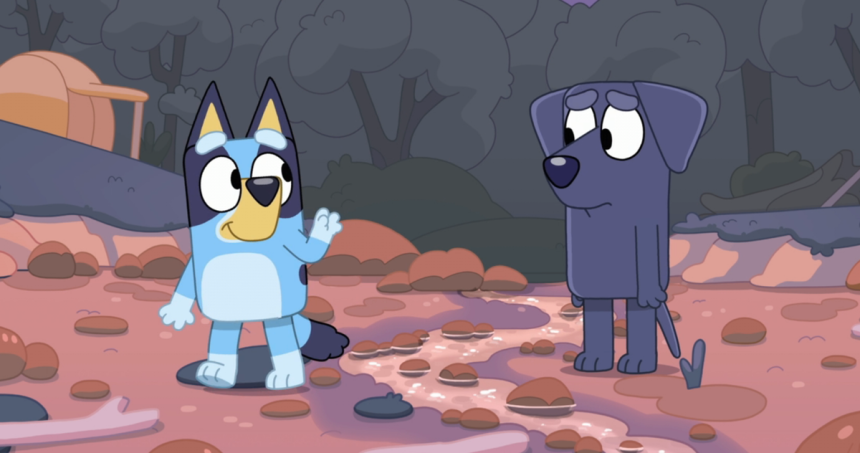Bluey hits in the same way really great observational comedy hits: We are struck by the sensation of everyday life being reflected back to us in a way that makes it newly visible and newly appreciated. It’s overwhelming to feel seen.
Photo: Disney+
This article was originally published on February 13, 2024.
What is it about Bluey, the Australian children’s cartoon about a family of dogs, that makes people weep? It is an emotional show — but lots of children’s media is emotional, and there are no roundups of the most cry-inducing episodes of Daniel Tiger’s Neighborhood. (It does, to be fair, feature a song titled “It’s Okay to Feel Sad.”) Bluey is about families and childhood, but again, so are so many other children’s shows. There’s a distinct divide between the kinds of people who are watching Bluey: Children are having a great time and reenacting the games from the show; adults, meanwhile, are sobbing! What is Bluey’s special tearjerking power? How does it smash that button over and over?
The list of weepy Bluey episodes is both long and personal, but let’s consider one in particular: “Camping,” an episode from the show’s first season. The story, which plays out over a scant seven minutes, focuses on Bluey and her family on a camping trip, where Bluey makes friends with a kid named Jean-Luc whose family is also on vacation that week. Bluey and Jean-Luc create an elaborate pretend game together, building a little shelter to live in, planting seeds to grow food, and pretending that Bluey’s dad is a wild pig they’re hunting. But Jean-Luc only speaks French and Bluey only speaks English, so the game they play over several days happens entirely through inference and drawing each other pictures. When they finally capture their wild-pig prey (Bluey’s dad, Bandit, cooperatively sprawls on the ground), Jean-Luc tries to tell Bluey that he’s leaving the next morning, but Bluey doesn’t understand and waves goodbye fully expecting to wake up and keep playing. The next morning, Jean-Luc’s tent is gone, and Bluey is heartbroken.
“Sometimes special people come into our lives, stay for a bit, and then they have to go,” Bluey’s mom tells her. “But that’s sad!” Bluey says. “It is. But the bit where they were here is happy, isn’t it?” Bluey agrees, but she’s still sad about it.
All of it’s already so moving, from the loveliness of these two kids playing together without understanding each other to the simple, comforting repetition of Bluey waking up each morning and running over to unzip Jean-Luc’s tent. The aesthetics are a part of this, too: Bluey’s animation style is brightly colored and blockily drawn but with extremely detailed focus on making the world look realistically magical. The creek where Bluey and Jean-Luc play shimmers in the sun, and the flowers that bloom around them are depicted from a low angle, re-creating the sensation of being a kid lying on the ground. “Camping” has already provided more than enough to feel verklempt about, up to and including the moment when Bluey’s mom, Chilli, points to the night sky full of stars.
But then “Camping” really twists the knife, and it’s this move that distinguishes Bluey from every other perfectly nice show about childhood and turns it into an absolute heavyweight cryfest. In the final moments of the episode, a seed Bluey and Jean-Luc planted on the first day of their game sprouts and grows rapidly, transforming into a sapling and then a tree. Bluey, now many years older, walks back into the frame and sits down next to the tree to read. Then, from out of frame, Bluey hears someone say “Hello, Bluey!” The frame cuts to a wide image of the creek, where Jean-Luc is standing and waving. Their tails wag gently, and the episode ends.
The final few seconds turn “Camping” from a sad, sweet episode of Bluey into a show operating on an entirely other register. The tree growing, an older Bluey, Jean-Luc’s reappearance — all of it is legible to kid viewers, and on that level feels like a happy conclusion of a story that otherwise would have remained sadly unresolved. But for adult viewers, Jean-Luc’s reappearance pings a different set of feelings. It takes a story that’s already about the brevity of human connections and adds in an improbable, magical moment of grace. Kids, who are used to fairy tales, assume that Jean-Luc and Bluey will be reunited, so they’re happy but unsurprised when that comes true. Adults know how unlikely it is to ever see people like that again, and the few times it does happen feel like improbable, inexplicable gifts, little moments that are powerful in part because they can catch you by surprise.
“Camping” is one of the few Bluey episodes to pull off that particular move, the sudden fast-forward several years into the future that offers a tiny glimpse of how these characters will feel as they get older. But it’s representative of how Bluey is able to find gestures that feel soaring and monumental when they’re inside everyday, familiar settings. This is part of the cry formula, too: It is an uncannily sensitive observational show about family life, and most Bluey episodes tend to focus on some very specific scene, type of interaction, or repeating pattern in its family of dogs. “Camping” is not about vacation writ large; it’s about the hyperparticular experience of meeting another kid who happens to be on vacation in the same place you are and the intensity and brevity of that friendship. And Bluey’s details are so carefully drawn: their family car full of stickers and crumbs and wrappers, the way a kid’s voice sounds when she complains about something small, the moment a parent completes enough of a kid game that they can quietly look at their phone. Bluey hits in the same way really great observational comedy hits: We are struck by the sensation of everyday life being reflected back to us in a way that makes it newly visible and newly appreciated. It’s overwhelming to feel seen.
There’s also something telling about how carefully Bluey episodes are built so that kids don’t cry. When I asked my most emotionally open kid, my 6-year-old, why Bluey doesn’t make her feel like crying, she told me that kids “are too busy thinking about the next shenanigans they” — meaning Bluey and Bingo — “should do.” Most Bluey episodes operate on many narrative levels at once, and they tend to introduce the big emotional ideas through the mechanism of some game Bluey and Bingo are playing. The tragedy of “Camping,” for my 6-year-old, is not about the gorgeous and heartbreaking experience of people entering and exiting our lives for reasons beyond our control. The issue is that when Bluey and Jean-Luc are separated, the game stops. “Onesies,” another regularly named Bluey weeper, is packaged inside a premise in which Bingo puts on a cheetah costume and becomes consumed with the feral spirit of an apex predator. Sure, there’s an emotional core underneath there: The costume is a gift from the kids’ aunt, who hasn’t visited her nieces in years because she’s grieving her own infertility. Even without that specific layer of understanding, it illustrates a sadness that kids have abstract familiarity with (wanting something you can’t have). But the real depth of it is about the pain of being unable to have a child. Of course it’s easier for a 6-year-old to dismiss the part she only glancingly understands in favor of the shenanigans.
The best Bluey episodes are built on a double vision with part of them designed as fantastic kids’ games and part of them anchored in some very deep emotional truth. But it’s not like adults only cry at the parts of “Camping” that aren’t the game. The game part, the child part, is the most important key to Bluey’s impressive crying formula. The fact of its being a kid’s show is so disarming; it allows adults to remember the experience of childhood with its open sincerity and pure, unmediated bolts of joy. Everything in Bluey’s world is bright and drawn with clarity. Everything is simple. Until, suddenly, the adult perspective is overlaid on the story: knowledge that time passes very quickly, that people age, that some things are immutable no matter how much we want them to change. The two sides don’t undermine each other; there’s no easy answer to parental frustration or impatience or sense of loss, but there’s also no moment when the adult problems are given more weight or significance than the silly kid games. It’s all there together, adult experience and child desire, a harmonic resonance of feelings. How could you not cry?











